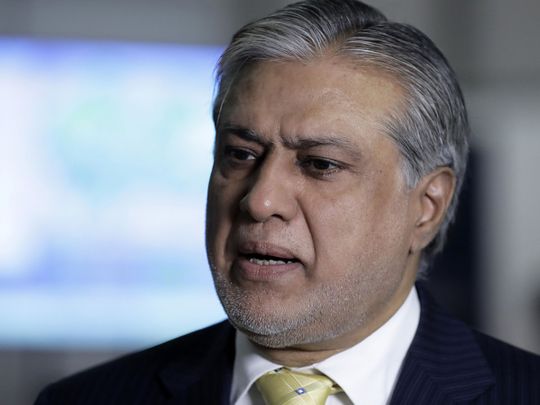
Islamabad: Pakistan’s new finance minister, Ishaq Dar, will work to rein in inflation and cut interest rates, he said on Wednesday, calling the rupee currency undervalued and promising a strong response to resolve the South Asian nation’s worst economic crisis.
In his fourth time in the role, the chartered accountant must tackle a balance of payment crisis, foreign reserves that cover barely a month’s imports, historic lows in the rupee, inflation exceeding 27 per cent and the aftermath of devastating floods.
“We will control inflation,” Dar told reporters, referring to the deep-rooted challenges ahead, in televised comments made after he was sworn in. “We will bring interest rates down.” He had a warning for currency market speculators, saying that the Pakistani rupee was undervalued.
“Our currency right now is not at the place where it should be, it is undervalued,” said Dar, who is known to favour currency market intervention to keep the rupee stable.
“I hope the speculators will stop. I think they have already got it and we are seeing the rupee rising,” he added. “No one will be allowed to play with the Pakistani currency.” A member of parliament’s upper house, Dar got the job after his predecessor, Miftah Ismail became the fifth to quit in less than four years, amid persistent economic turbulence.
The rupee has been gaining firmly ahead of his appointment and stocks responded positively before Wednesday’s swearing-in.
Analysts say Dar’s key mandate is to halt inflation that mainly stems from his predecessor’s unpopular decisions to stick to preconditions set by the International Monetary Fund (IMF), including rolling back subsidies made by Khan’s government.
Sharif’s coalition government says it inherited a wrecked economy after Khan’s ouster in a vote of no-confidence in April, a charge the former premier denies.
As the new government took over, the IMF’s $6 billion bailout package agreed in 2019 was in the doldrums because of the lack of an agreed policy framework.
Last month the IMF board approved the programme’s seventh and eighth reviews, allowing the release of more than $1.1 billion.
The tranche, said former finance minister Ismail, was likely to be boosted after Pakistan sought help to remedy economic losses of an estimated $30 billion caused by the unprecedented floods.
The disaster could cut GDP growth below 3 per cent, down from 5 per cent estimated for fiscal 2022-23, the government has said.












